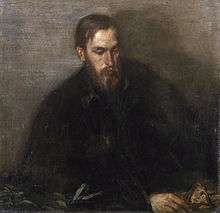Thomas Sturge Moore


Thomas Sturge Moore (4 March 1870 – 18 July 1944) was an English poet, author and artist.
Biography
He was born at 3 Wellington Square, Hastings, East Sussex, on 4 March 1870 and was educated at Dulwich College, the Croydon School of Art and Lambeth School of Art.[1][2] He was a long-term friend and correspondent of W. B. Yeats, who was to describe him as "one of the most exquisite poets writing in England". He was also a playwright, writing a Medea influenced by Yeats' drama and the Japanese Noh style. As a wood-engraver and artist he designed the covers for poetry editions of Yeats and others.[3][4]
Sturge Moore was a prolific poet and his subjects included morality, art and the spirit writing in a 'severely classical tone', according to poet/critic Yvor Winters.[3] His first pamphlet, Two Poems, was printed privately in 1893 and his first book of verse, The Vinedresser, was published in 1899. His love for poetry led him to become an active member of the Poetry Recital Society.
In 1901 Moore, with Yeats, Laurence Binyon, Charles Ricketts, and Ethel and Sybil Pye, formed the Literary Theatre Club. Moore's first (of 31) play to be produced, a copyright reading of Aphrodite against Artemis, was the first production staged by the club, at the Dalston Theatre on 30 July 1901. Yeats described the play as "powerful with a beautiful constrained passion."[5]
Moore received a civil list pension of £75 per annum in 1920 in recognition of his contribution to literature. In 1930 he was nominated as one of seven candidates for the position of Poet Laureate. He suffered from chronic ill health, suffering a series of heart attacks in 1942 and 1943, and died on 18 July 1944 at a convalescent home, St Andrews Cottage in Clewer, Windsor, Berkshire, from a kidney infection following a prostate operation.[4][6][7][8]
Family
Sturge Moore adopted the use of his middle name 'Sturge' (his mother's family name) as a way of avoiding confusion with the poet Thomas Moore.[4]
Moore married Marie Appia, sister of the Swiss stage designer Adolphe Appia, on 26 November 1903. They had two children: Daniel Sturge-Moore, journalist and broadcaster; and Henriette Sturge-Moore, prominent theatre designer, teacher and interior decorator.[9][10][11]
Moore was the brother of the Bloombury philosopher George Edward Moore, one of the founders of the Analytic tradition in philosophy, and uncle of Nicholas Moore, New Apocalyptics poet of the 1940s, and of the composer Timothy Moore.[1][4][12]
References
- 1 2 Hodges, S, (1981), God's Gift: A Living History of Dulwich College, pp. 87-88 (Heinemann: London)
- ↑ Moore, Thomas Sturge. "Thomas Sturge Moore Papers". Archives & Manuscripts. Senate House Library, University of London. Retrieved 11 Feb 2014.
- 1 2 Untermeyer, Louis, Modern British Poetry, Doubleday and Page & Co, 1920
- 1 2 3 4 Gwynn, Frederick L (1951). Sturge Moore and the Life of Art. Lawrence, Kansas: University of Kansas Press. Retrieved 11 Feb 2014.
- ↑ Schuchard, Ronald (2008). The Last Minstrels : Yeats and the Revival of the Bardic Arts. Oxford University Press. pp. 41–48. ISBN 9780191528064. Retrieved 14 October 2014.
- ↑ Public Records Office. "1944". England & Wales, National Probate Calendar (Index of Wills and Administrations), 1858-1966. Kew, Surrey: The National Archives. p. 756.
- ↑ Kelly, John. "Moore, Thomas Sturge". Oxford Dictionary of National Biography. Oxford University Press. Retrieved 8 June 2014.
- ↑ Bowers, Jr., William Edgar (1953). The Poetry of Sturge Moore. Stanford, CA: Dept. of English, Stanford University. p. iv.
- ↑ Brett, Charles Edward Bainbridge (1978). Long shadows cast before: nine lives in Ulster, 1625-1977. Edinburgh: J. Bartholomew. p. 45. ISBN 9780702810589. Retrieved 14 October 2014.
- ↑ Dunlop, Frank (24 October 1995). "Obituary: Riette Sturge Moore". The Independent. London. Retrieved 14 October 2014.
- ↑ Legge, Silvia (1980). Affectionate Cousins: T. Sturge Moore and Marie Appia. Oxford University Press. ISBN 9780192117618.
- ↑ Marshall, Nicholas (10 March 2003). "Timothy Moore". The Guardian. Retrieved 14 March 2014.
External links
| Wikiquote has quotations related to: Thomas Sturge Moore |
- "Sturge Moore and the Life of Art" by Frederick L. Gwynn (University of Kansas Press, Lawrence, 1951). 159 pages, includes "A Bibliography of Sturge Moore." Open access full-text PDF file available from the University of Kansas.
- Papers of Thomas Sturge Moore in Senate House Library, University of London
- Works by Thomas Sturge Moore at Project Gutenberg
- Works by or about Thomas Sturge Moore at Internet Archive